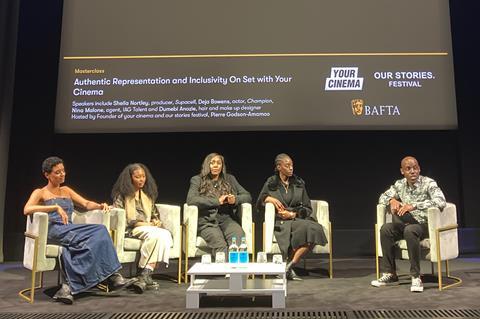Momentum Lost in UK Film and TV Industry's Efforts to Represent Black and Global Majority Voices A panel of Black creatives recently met at Bafta's Lo
Momentum Lost in UK Film and TV Industry’s Efforts to Represent Black and Global Majority Voices
A panel of Black creatives recently met at Bafta’s London headquarters to discuss the lack of momentum in the UK film and TV industry in terms of commissioning stories that represent Black and Global Majority voices.
The discussion followed an initial uplift in 2020, when the industry appeared to recognize the need for greater diversity and inclusion. However, this momentum has been lost as the industry has returned to a more risk-averse approach.
Sheila Nortley, producer of Netflix series Supacell, stated that the current state of the industry is concerning. "We’ve gone from ‘we want everyone to come in, we want to hear your stories, we want diversity and inclusion’ to ‘now the economy is struggling, people want to return to the safe bet.’ People who have been working here for 30 or 40 years – unfortunately, those people don’t look like us, and those doors start closing again."
Nortley also emphasized the importance of diversity and inclusion at all stages, particularly when it comes to commissioners. "I would love to see more Black and Brown people and all underrepresented in those spaces able to greenlight the projects. Sometimes at pitching stage, there’s already a barrier. It starts at the top."
Nina Malone, an IAG talent agent, concurred, stating that funding is a significant issue. "If there could be more diversity in funding and access to pots. A lot of time that’s a barrier. Behind the camera, it’s us all making the effort to make more effort in hiring. We can’t just go to the same places every time. We can’t just use the same pools, use the same people."
Further discussion included:
- The "one at a time" mindset in the UK industry, where Black actresses are often only recognized in top roles, with Letitia Wright and Cynthia Erivo being the current standout stars.
- The lack of progress in feature films, where people of colour are underrepresented, particularly in high-level positions.
- The need for education and support structures for individuals entering the industry.
- The importance of diversity in a commercial sense, as it can enrich the film and TV industry, and rebuild the economy by bringing in new perspectives and stories.
The panel also emphasized the need for safe spaces to speak and the importance of acknowledging that diversity is not a burden, but rather an opportunity for growth and development.
Conclusion:
The discussion highlighted the pressing need for the UK film and TV industry to revitalize its efforts in promoting diversity and inclusion. By recognizing the value of diverse voices and perspectives, the industry can not only create more authentic representation on screen but also contribute to a more vibrant and creative industry as a whole.
FAQs:
- What is the current state of the UK film and TV industry in terms of diversity and inclusion?
- The industry has lost momentum since the initial uplift in 2020, and is now more risk-averse and less inclusive.
- What are the main challenges facing the industry?
- A lack of representation at higher levels, limited access to funding, and a "one at a time" mindset.
- What are some potential solutions to these challenges?
- Increasing diversity in funding, providing education and support structures for new entrants, and recognizing the commercial benefits of diversity.
- How can the industry move forward in promoting diversity and inclusion?
- By recognizing that diversity is not a burden, but an opportunity for growth and development, and by providing safe spaces for underrepresented voices to be heard.

COMMENTS